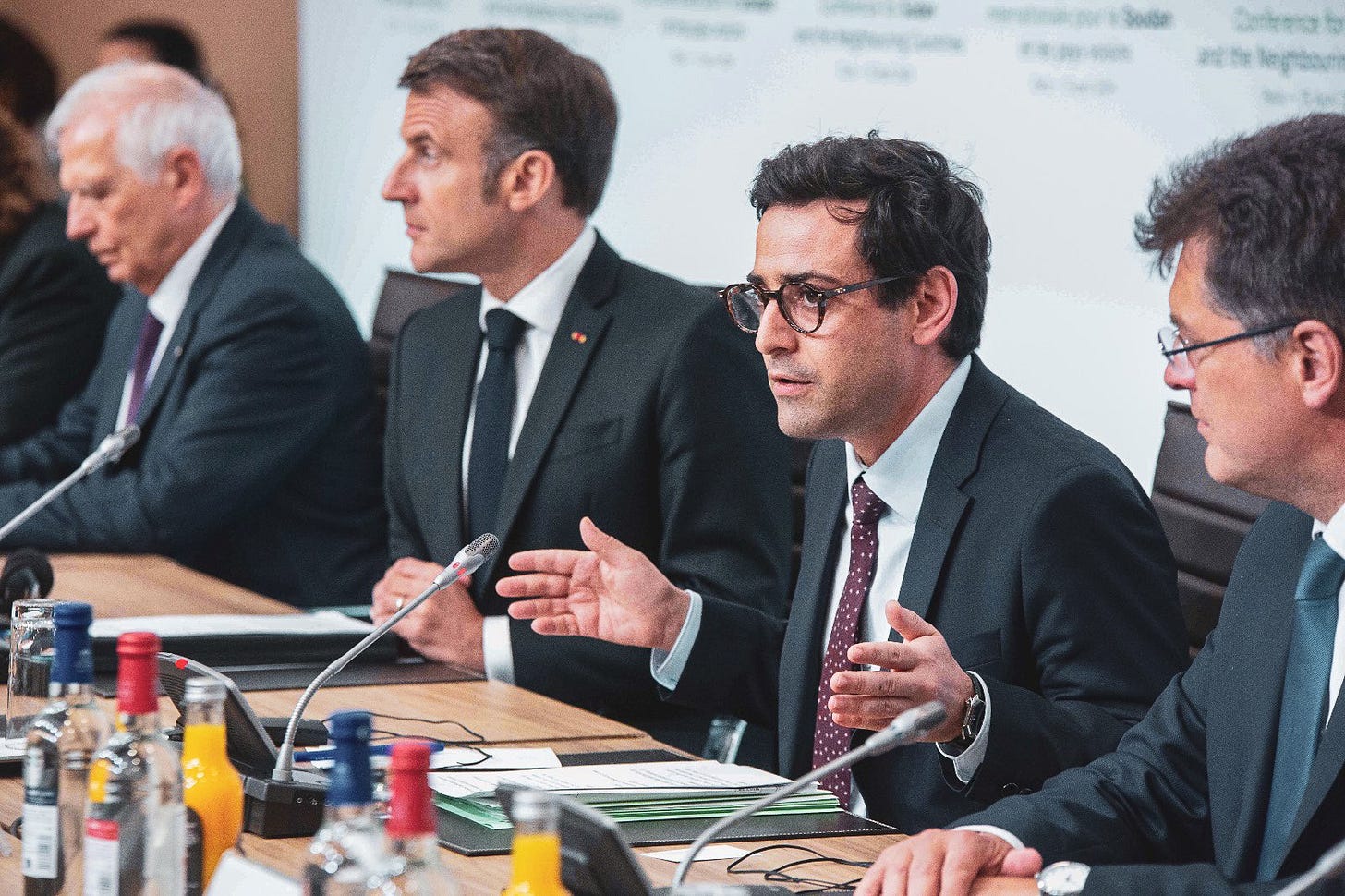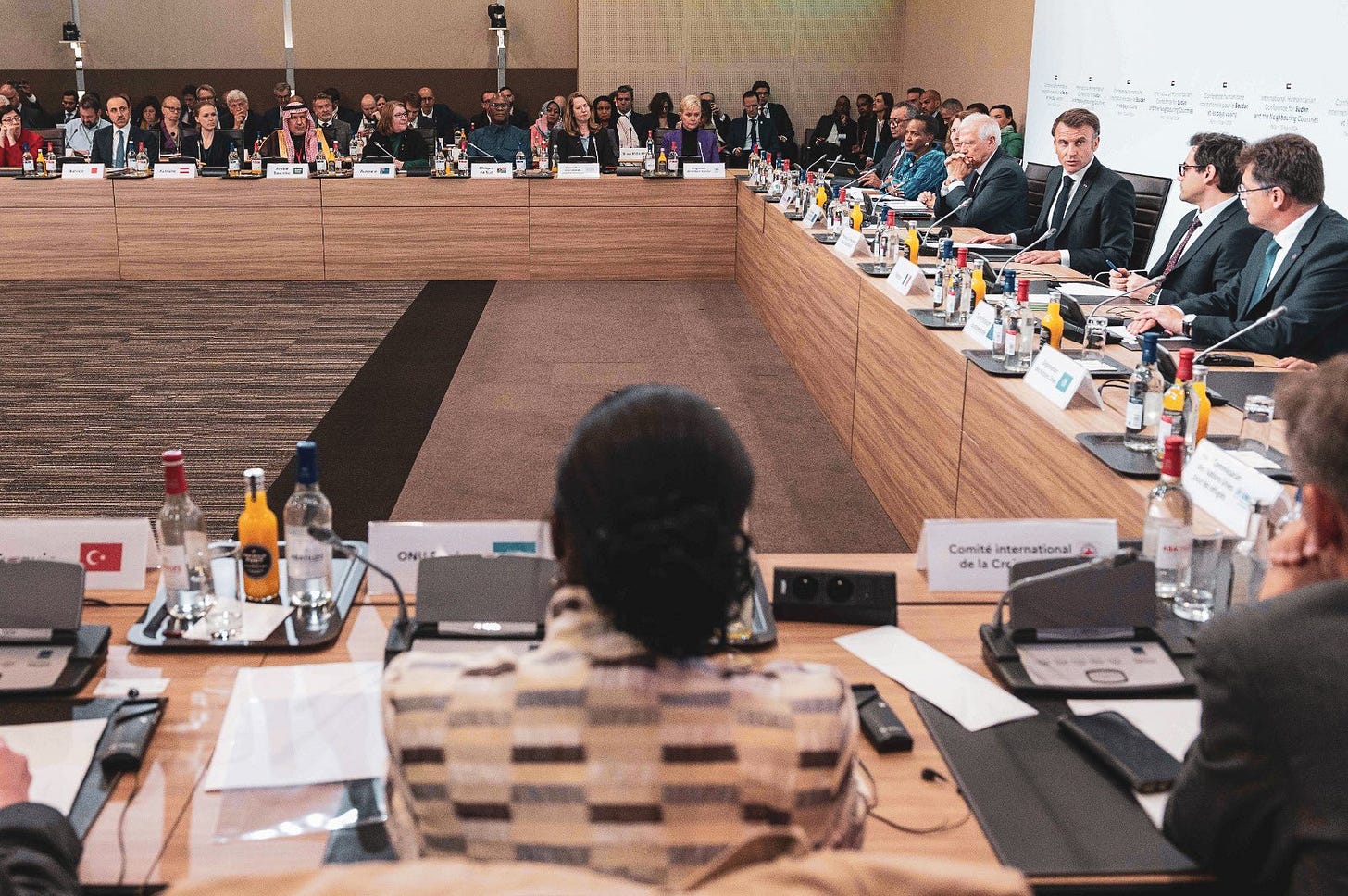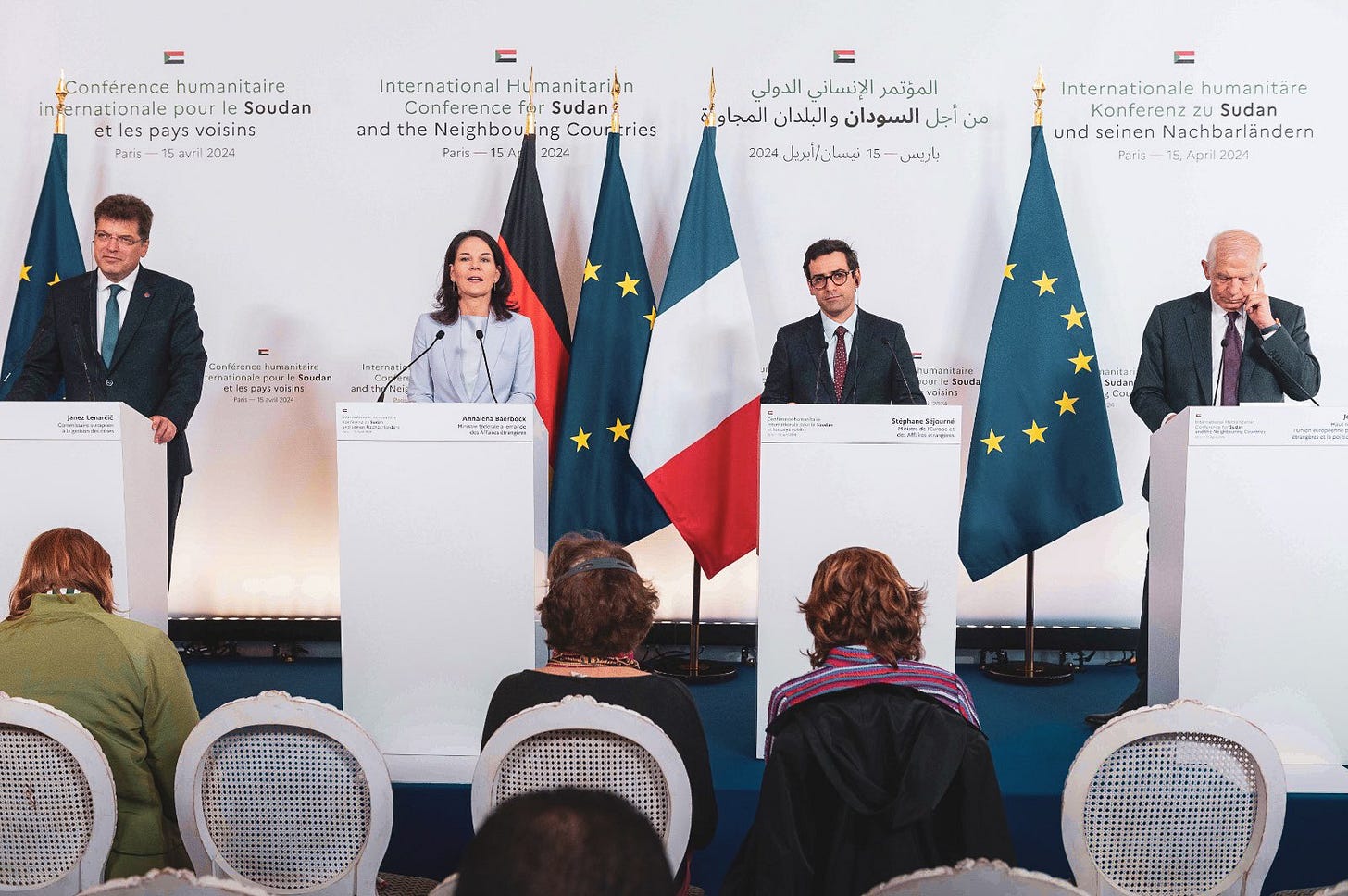Paris conference boosts Sudan aid funding to 50%
MSF says pledges are still "gravely inadequate"
France stepped up for Sudan this week, holding a conference in Paris where donors pledged major increases to humanitarian funding in the war-torn East African nation.
The conference coincided with the one-year anniversary of Sudan’s war and brought together representatives of donor nations, international aid organizations, Sudanese aid groups, and neighboring and regional states.
Foreign Minister Stéphane Séjourné said afterwards, “The Paris conference for Sudan and neighboring countries achieved its objectives. The 50 countries attending committed to financing more than €2 billion in humanitarian aid for the Sudanese. This morning, the UN plan was only 5% funded; it is now more than 50% funded.”
He was referring to a two-part United Nations appeal for nearly €3.9 billion for its humanitarian agencies and partner nonprofits. The appeal comprises two components: approximately €2.5 billion for the humanitarian response inside Sudan, and €1.2 billion for the needs of Sudanese refugees in five neighboring countries.
The response inside Sudan is coordinated by the UN Office for the Coordination of Humanitarian Affairs (OCHA), whereas the regional response is coordinated by the UN Refugee Agency (UNHCR). The World Food Programme (WFP) and International Organization for Migration (IOM) are two additional UN agencies playing a big role.
France did not detail the sources of the announced €2 billion in new pledges, though several nations publicly announced their own pledges, including Germany (€244 million), France (€110 million), the United Kingdom (£89 million, equivalent to €104 million), and Canada (€90 million).
The United States, which is historically the largest humanitarian donor in Sudan, has pledged $147 million (€138 million) this year, following a recent cut to the U.S. foreign aid budget. That amount compares to €350 million from the European Union.
Unannounced commitments from major Arab states may account for the rest of the €2 billion. Last year’s UN appeal for Sudan was 43% funded, and its regional response plan was 38% funded, according to OCHA, the UN coordinating agency. The gaps meant that Sudanese in many places suffered from a lack of food, medical care, shelter, sanitation, and other services.
Even if the 2024 response plan is fully funded, Sudan is likely to face a famine later this year and next, according to forecasters. The scale and severity of the famine will depend on whether the fighting continues, the weather, humanitarian access, and whether farmers and importers can move food products safely to market.
Most but not all donor funds for Sudan flow through the United Nations. According to a Sudanese participant at the Paris conference, UN bureaucracy could slow the flow of aid to grassroots organizations that need it most.
“The United Nations has failed the people of Sudan,” he said. On the other hand, he stressed that the Paris event was encouraging and marked a unique opportunity for Sudanese civil society to gather and build unity, alongside international partners.
France invited Sudanese civil society and political leaders unaffiliated with the warring parties, who attended a dedicated seminar prior to the final session of the conference. The participants all agreed on the urgent need for a ceasefire in Sudan.
MSF criticism
Médecins Sans Frontières (MSF) responded to the Paris conference in a press release yesterday headlined “UN Sudan appeal falls short: Funds pledged are nowhere near enough to meet Sudan’s needs.”
The statement said that it was positive that so many countries have shown support for Sudan by raising €2 billion, nevertheless the conference “fell short” because the humanitarian needs are so vast and the full UN appeal is nearly €4 billion.
The medical aid organization also highlighted the problem of humanitarian access, not just funding, saying that a Sudanese military blockade on the movement of supplies and personnel into areas under Rapid Support Forces control means that millions of people are going without medical assistance.
“Since October, we have been unable to bring supplies to our health facilities in Khartoum, and currently we have just 20 percent of our medical supplies left in the Turkish Hospital in the south of the city. There is an urgent need to bring in more supplies — already, we have run out of malaria treatment, and very sadly, children have died as a result.”
MSF called on the UN to use its influence with the warring parties to negotiate access across frontlines and across borders so that aid can be safely delivered.
Excerpts from the communiqué

Following the conference, the Foreign Ministry of France issued a communiqué jointly with Germany and the EU, which co-hosted the conference. Here are excerpts:
“France, Germany and the European Union express their solidarity with and support for the Sudanese civilian population, the primary victims of this war. We strongly condemn the violence against civilians, including attacks on ethnic grounds, indiscriminate bombardment of residential areas and sexual and gender-based violence, including against children. It is crucial to continue reminding the parties of their obligations under international humanitarian law and fight impunity by doing everything possible to make sure those responsible for atrocities are prosecuted and held accountable.”
“We commend the efforts of the Secretary-General’s Personal Envoy Ramtane Lamamra to find a solution to this conflict and alleviate suffering, as well as the work of international and local humanitarian organisations to support the populations affected by the conflict and the efforts of neighbouring States to take in large numbers of people seeking refuge within their borders.”
“Our collective efforts to ensure that Sudan does not become a forgotten crisis will not waver and we urge all our partners to step up their efforts to bring it to an end.”
The full communiqué is available here in English and here in Arabic.
France’s foreign ministry produced this brief video about the pledging conference:
Meanwhile, on the sidelines of the humanitarian conference, France hosted a meeting of foreign ministers that focused on political aspects of the Sudan crisis, including the several separate peace initiatives last year, including one by the East African bloc IGAD, and another by Saudi Arabia and the United States.
A joint statement by the foreign ministers following this meeting was similar to the humanitarian communiqué but touched on additional political points, including an appeal for regional and international actors “to fully support a consolidated Sudan peace initiative, building from the Jeddah platform, the African Union and IGAD-led initiative and the mechanism of the neighbouring countries.”
Background: France in Sudan
France is not historically as politically active in Sudan as it is in francophone West Africa, but French humanitarian organizations, particularly Médecins Sans Frontières, have played a leading role in Sudan for decades.
France is also a destination for Sudanese migrants fleeing conflict in Darfur, and dissidents persecuted by the Sudanese military dictatorship.
In 2021, following the popular uprising that ousted long-time Sudanese dicator Omar al-Bashir, France hosted a conference on Sudan “aimed at marking the full reintegration of the country within the international community, launching the country’s debt relief process and encouraging private investments.”
Meanwhile, recent developments in the Sahel have upended a region of historical French influence. Niger, Burkina Faso, and Mali recently evicted French and UN military forces and forced diplomatic outposts to close down or scale down, even as Russia scaled up its presence in these countries.
The potential for Sudan’s crisis to destabilize Chad, one of the only central African countries still cooperating with France, creates a strategic incentive for France to play a constructive role in Sudan.
Other news in brief
The Rapid Support Forces imposed control over Mellit in North Darfur after clashes with the Juba Peace Forces (JEM and SLM-MM) on Sunday.
Three civilians were killed, including a woman, and others were injured after fighting in the al-Tajaniyah neighborhood and Abu Shouk camp in El Fasher.
Warplanes last night bombed several sites of Kutum city in North Darfur, resulting in three injuries among the citizens.
The RSF said they managed to expel the Sudanese army from defensive positions near Managil in central Sudan today.
Five civilians were killed and more than 10 others were injured in renewed fighting between the army and RSF in El Obeid, North Kordofan State on Sunday.



